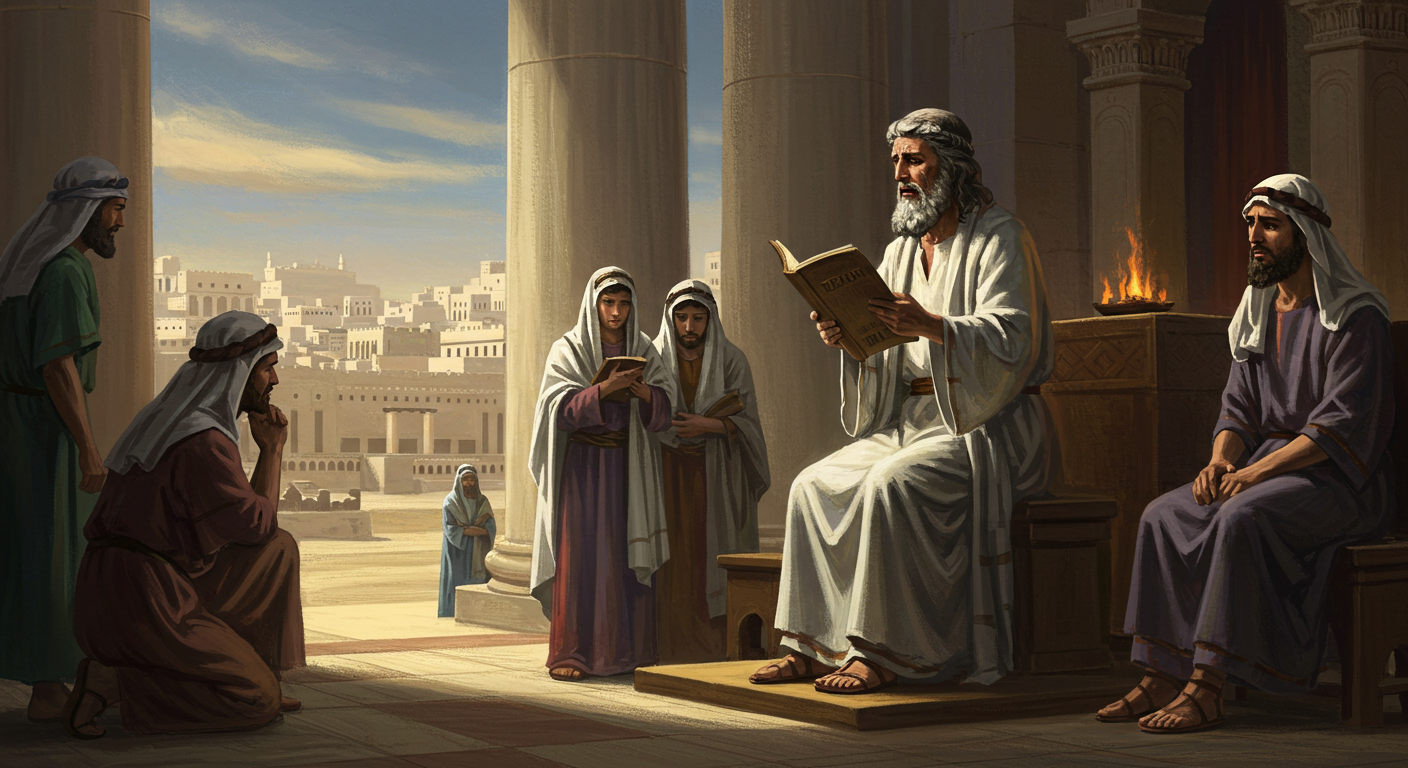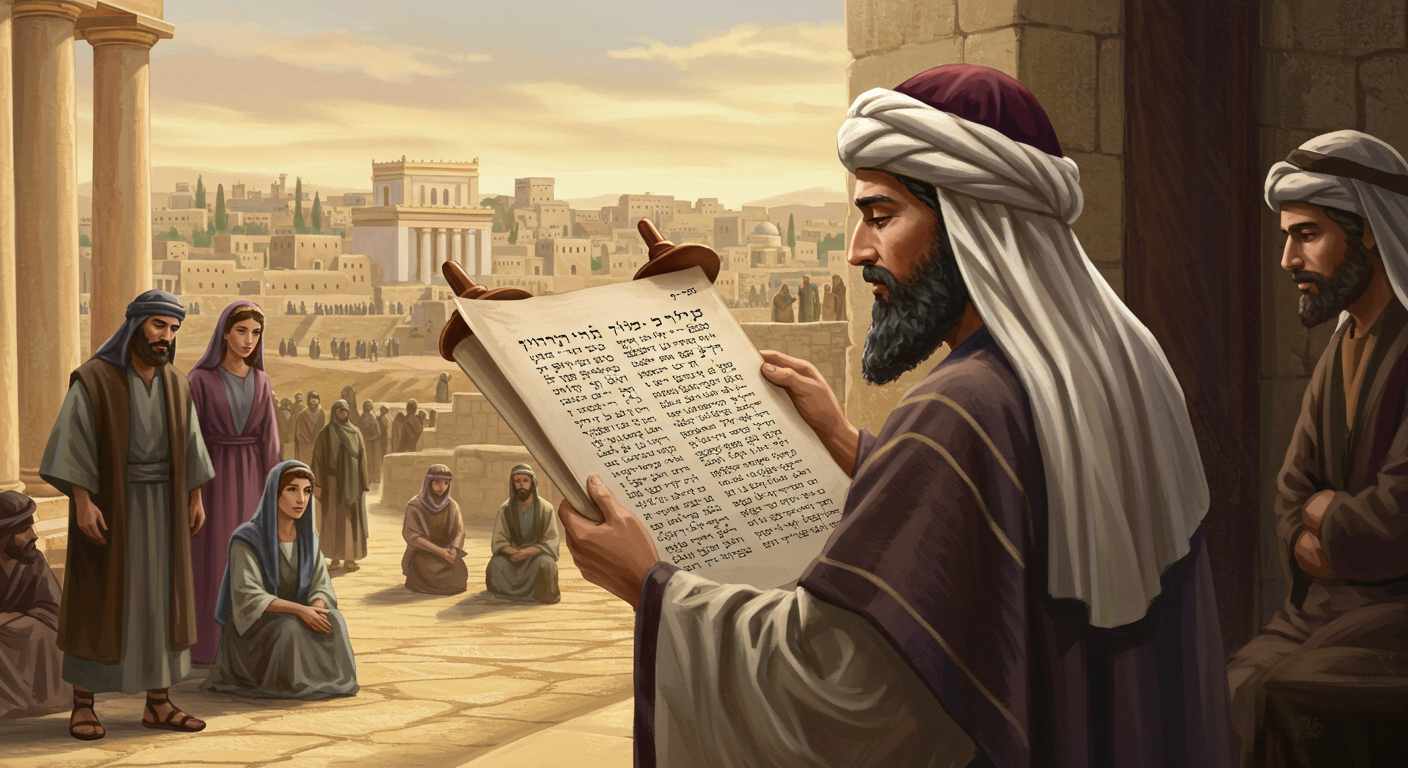Explore Ezra’s heartfelt prayer in Ezra 9:6–15, diving into its historical depth and modern relevance. Discover lessons on confession, grace, and redemption.

Ezra’s Prayer Of Confession – Ezra 9:6–15
Introduction
Imagine finding out that your community has strayed so far from its core values that it seems almost impossible to steer it back on course. What would you do? For Ezra, the priest and scribe of the Jewish people who returned to Jerusalem from exile, this wasn’t just a theoretical dilemma. His heartfelt prayer of confession, found in Ezra 9:6–15, is a raw, honest conversation with God that captures the complexity and burden of leading a community fraught with spiritual and cultural challenges. We’ll deep dive into this prayer, exploring its historical significance, its emotional depth, and how its timeless themes can resonate with us today.
In this article, you’ll uncover the rich background of Ezra’s prayer and dissect its key elements. You’ll learn the profound lessons we can draw from it and how similar prayers peppered throughout the Bible augment our understanding. Most importantly, you’ll find practical ways to bring these valuable principles into your own life.
Background of the Prayer
To truly appreciate Ezra’s prayer of confession, we first need to understand the historical and cultural backdrop against which it was made. Ezra was a leader during a pivotal moment in Jewish history when the Israelites were trying to re-establish themselves in Jerusalem after decades of exile in Babylon. Under King Cyrus of Persia, they were allowed to return and rebuild the temple. However, this return was fraught with spiritual setbacks, primarily due to the intermarriage with surrounding pagan nations, which threatened their covenant relationship with God.
Ezra, with all these developments on his shoulders, became the guide for bringing the people back to the law of God. When he learned of these intermarriages, his response was dramatic—he tore his clothes and pulled his hair, a typical expression of distress in their culture. His next step was pivotal: he prayed. In Ezra 9:6, Ezra offers his confession, saying, “I am too ashamed and disgraced, my God, to lift up my face to you.” This was not just his shame but a reflection of communal guilt for ignoring divine directives.
Key Elements of the Prayer
Ezra’s prayer is a masterclass in humility, accountability, and repentance. Breaking it down reveals vital components we can grasp onto.
Shame and Confession
Ezra begins by acknowledging the overwhelming shame and disgrace he feels on behalf of his people. His words, “Our sins are higher than our heads and our guilt has reached to the heavens” (Ezra 9:6), vividly paint the dire spiritual state the people are in. This confession isn’t just lip service—it’s an open admission of their collective distance from God.
Acknowledgment of Grace
Despite the dark backdrop, Ezra recognizes God’s grace during their captivity. In Ezra 9:8, he acknowledges that God has given them “a little relief in our bondage.” This reflection on past grace serves to highlight the benevolence of God even in their rebellion, making the current situation even more poignant.
Recognition of Their Iniquity
Ezra does not shy away from pinpointing the exact nature of their wrongdoing. He states plainly that they have disregarded God’s commandments, a truth that rests heavy in his prayer: “We have forsaken the commands” (Ezra 9:10). This unwavering honesty is the bedrock of true confession.
Hope and Redemption
Even while identifying failures, Ezra’s prayer is laced with hope. He ends with a subdued yet persistent appeal for God’s mercy, indicating that there still lies a possibility for redemption (Ezra 9:15). His faith in God’s just and forgiving nature serves as a sliver of light in an otherwise solemn prayer.
Lessons We Can Learn
Ezra’s prayer is more than an ancient confession—it’s a timeless guide for modern spirituality. Let’s draw some spiritual principles that can enrich our faith journey.
The Power of Honest Confession
Ezra’s transparency is relatable for anyone who has ever bent under the weight of wrongdoing. His candidness encourages us to approach God without pretense, acknowledging our failures openly, thus paving the way for genuine healing and change.
Acknowledging Our Blessings
Even when confessing sins, acknowledging God’s past and present kindnesses, as Ezra did, is crucial. Reflecting on the grace we have received helps us maintain a sense of humility and gratitude, forming a solid foundation for a revitalized relationship with God.
Learning from Our Mistakes
Ezra’s detailed acknowledgment of the Israelites’ missteps serves as a stark reminder to not repeat past mistakes. Studying how they veered off course, we’re reminded that learning from history is essential to spiritual growth.
Ever-Present Hope in God’s Mercy
Despite the gravity of the situation, Ezra doesn’t fall into despair. His prayer emphasizes hope, underlining that God’s mercies are new every morning. This serves as a reminder that no matter how far we stray, redemption is always within reach if we turn back to God.
Similar Prayers in the Bible
The Bible is rich with prayers of confession and intercession, resonating with the themes found in Ezra 9.
Daniel’s Prayer
In Daniel 9:4–19, we see Daniel’s earnest confession on behalf of Israel, highlighting their collective sin and petition for God’s mercy. The similarity to Ezra’s prayer is striking, as both address national sin and the hope for divine intervention.
Nehemiah’s Intercession
Nehemiah’s prayer in Nehemiah 1:5-11 reaffirms God’s covenant, confessing sins and seeking favor and guidance. His approach, similar to Ezra’s, stresses the importance of acknowledging past failures while seeking God’s guiding hand for the future.
Solomon’s Dedication
Solomon’s prayer of dedication in 1 Kings 8:22-53 encompasses a plea for God’s enduring presence and forgiveness. It showcases an understanding of human frailty and a reliance on divine benevolence.

How to Apply This Prayer Today
Ezra’s prayer holds powerful lessons for us, applicable in countless modern contexts. Here’s how you can incorporate its principles into your daily life.
Personal Reflection
Take time to honestly evaluate your own life. This involves acknowledging your shortcomings, expressing sincere remorse, and seeking God’s forgiveness, echoing Ezra’s humility.
Building Gratitude
In your prayer life, consciously acknowledge God’s past faithfulness and current grace. Cultivating gratitude can transform your outlook and deepen your spiritual resilience.
Avoiding Complacency
Let Ezra’s plea to learn from past mistakes remind you to constantly assess your actions and beliefs, ensuring they align with your core values and spiritual goals.
Seeking Hope
Finally, maintain a hopeful perspective, trusting in God’s mercy. Whether confronting personal failures or larger community challenges, rely on this hope to inspire action and change.
Related Bible Verses
Other passages reinforce the themes of confession, repentance, and divine mercy found in Ezra’s prayer:
- Psalm 51:1-2 – David’s cry for mercy and cleansing from sin. Read here.
- Lamentations 3:22-23 – Assurance of God’s unwavering compassion and faithfulness. Read here.
- 1 John 1:9 – Encouragement that confession brings forgiveness and purification. Read here.
- 2 Chronicles 7:14 – Promise that humility and seeking God can bring healing. Read here.
Closing Thoughts
Ezra’s prayer in Ezra 9:6-15 is a timeless expression of communal confession and reliance on divine mercy. It provides a powerful template for us, emphasizing the need for transparency, repentance, gratitude, and hope in our spiritual walks. As you reflect on this prayer, may it inspire you to nurture a deeper and more genuine relationship with God.







